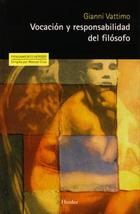This work of Gianni Vattimo, father of weak thinking and one of the key figures of postmodernism, is divided into three parts. In the first, the author explains the reasons for his view of philosophical practice, but distances itself from science, not pursued at all resemble literature, sociology, culture, science or any other form of artistic expression with literary pretensions, the philosophy is "different" sciences (exact or nature) and the humanities or art precisely because it is deeply committed to and involved in the substantive issues involved in each of these sciences . Second, the author specifies the interpretation of the concept of truth, but rather than truth as adequacy speaks of "fidelity" to a being who is at all events, and a subject that is primarily dialogue (participation). Finally, the last section of text on liability, calling and destiny in philosophy provides ...read more
Shopping cart
Loading cart
Important notices
|
|
Recordando a André Rouillé: Su legado en la fotografía André Rouillé 1948 - 2025 |
|
|
Libros de filosofía y co. Disponibles en Librería Herder |
|
|
Revista Filosofía & Co. nº 9 Nueva revista de filosofia divulgativa y actualidad |
|
|
"Espacios de la filosofía" - Mauricio Beuchot - Novedad Herder México |
|
|
Revista Filosofía & Co. nº 8 Nueva revista de filosofia divulgativa y actualidad |
Pay safely with:


In the webshop
New
|
|
Medios calientes 70159 $400.00 -0.00% $400.00 |
|
|
Amigdalatrópolis 70157 $390.00 -0.00% $390.00 |
|
|
La instauración filosófica 70142 $570.00 -20.00% $456.00 |
|
|
Adiós al capitalismo 70116 $580.00 -0.00% $580.00 |
|
|
Su Majestad 70410 $319.00 -15.00% $271.15 |
In the press
Promotions
|
|
Panorama A1.1, Deutsch als Fremdsprache Übungsbuch 36726 $235.00 -35.00% $152.75 |
|
|
El tratamiento de los niños autistas 70240 $675.00 -25.00% $506.25 |
|
|
Historia del arte I 70244 $1,545.00 -25.00% $1,158.75 |
|
|
Diccionario de términos filológicos 70241 $900.00 -25.00% $675.00 |
|
|
Verbos conjugados $600.00 -25.00% $450.00 |









